|
|
|
Sort Order |
|
|
|
Items / Page
|
|
|
|
|
|
|
| Srl | Item |
| 1 |
ID:
146779
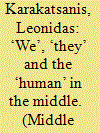

|
|
|
|
|
| Summary/Abstract |
This paper explores the way in which historiography produced in Turkey (or by Turkish scholars abroad) approaches foreign military/diplomatic interventions in the Ottoman Empire during the long nineteenth century. It focuses on three case studies where ‘humanitarian reasons’ formed the discursive basis/justification of such interventions. The author argues that when the distinction between victims and perpetrators, civilians and combatants, emerges as an interpretive dilemma in the debates of the historical period examined, similar interpretive and normative challenges are inherited by the historiographical accounts of it. The paper distinguishes two contrasting ways in which Turkish historiographical scholarship responds to such a dilemma. The first remains confined by the way Ottomans themselves viewed the world around them and uncritically reproduces rigid categories of selfhood and otherhood between ‘us’ and ‘them’. The second trajectory offers tools for understanding the conflicts behind the construction of the category of the human worth of international protection, and disentangles itself from the normative bind described above.
|
|
|
|
|
|
|
|
|
|
|
|
|
|
|
|
| 2 |
ID:
020229
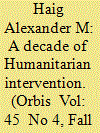

|
|
|
|
|
| Publication |
Fall 2001.
|
| Description |
495-501
|
|
|
|
|
|
|
|
|
|
|
|
|
|
|
|
| 3 |
ID:
117411
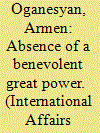

|
|
|
|
|
| Publication |
2012.
|
| Summary/Abstract |
AMERICAN AUTHOR Anne O'Hare McCormick (1880-1954), whose life experience was interwoven with both world wars, packaged into a single phrase the lessons to be derived from the tumultuous epochs when she famously wrote: "Today the real test of power is not capacity to make war but the capacity to prevent it."
|
|
|
|
|
|
|
|
|
|
|
|
|
|
|
|
| 4 |
ID:
115603
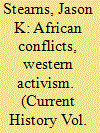

|
|
|
|
|
| Publication |
2012.
|
| Summary/Abstract |
For much of Africa's post-cold war history, the question has not been whether humanitarian intervention is a cover-up for big power interests, but why outsiders have been so reluctant to act.
|
|
|
|
|
|
|
|
|
|
|
|
|
|
|
|
| 5 |
ID:
115836
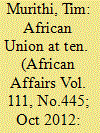

|
|
|
|
|
| Publication |
2012.
|
| Summary/Abstract |
AS THE AFRICAN UNION MARKED ITS TENTH ANNIVERSARY on 9 July 2012, it was still recovering from one of its most public disagreements. At the heart of this disagreement was the AU's interpretation of and commitment to good governance and humanitarian intervention. Sparked by the uprisings in Tunisia, Egypt, and Libya, and the contested November 2010 elections in Côte d'Ivoire, these issues came under intense debate. The NATO-led intervention in Libya - the AU's backyard - caught the organization unaware and divided its members on whether the military incursion, under the rubric of the UN doctrine of the 'responsibility to protect' (R2P), was warranted. Similarly, the earlier crisis in Côte d'Ivoire and the involvement of the UN and France led to criticisms of the AU's failure to respond in a unified and coherent manner.
|
|
|
|
|
|
|
|
|
|
|
|
|
|
|
|
| 6 |
ID:
175536
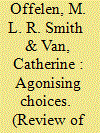

|
|
|
|
|
| Summary/Abstract |
Tragedy is one of the oldest metaphorical lenses of International Relations. The tragic vision of politics, from Thucydides to contemporary realist theorists, lies at the core of classical realism. However, it is striking how rarely the concept of tragedy has been applied to the discourse of humanitarian intervention. This lacuna is a weakness on both the intellectual and political levels, as nowhere are clashes between competing ethical perspectives more glaring. An examination of the concept of tragedy, as conceived from its Greek origins, can illuminate an understanding of the morally contradictory imperatives created by armed intervention. Using the Bosnian War as a case study, Greek classical tragedy provides a framework to grasp the agonising choices and insoluble ethical dilemmas brought about by humanitarian intervention, in contrast to mere narratives of salvation. The argument conveyed in this article seeks to reconcile a tragic vision with the idea of progress and political action. It concludes by suggesting that the fundamental lessons that lie at the heart of tragedy should be associated with another major concept in Greek culture, namely, the Aristotelian idea of phronesis or ‘practical wisdom’.
|
|
|
|
|
|
|
|
|
|
|
|
|
|
|
|
| 7 |
ID:
157988
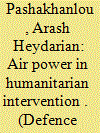

|
|
|
|
|
| Summary/Abstract |
It would be hard to overstate the importance of air power in humanitarian intervention (HI) and the Responsibility to Protect (R2P). Yet, the role of air power in HI and R2P has been understudied. This article seeks to remedy the lack of systematic investigation. It does so by developing a framework for assessing the effectiveness of air power during military operations in HI and R2P and applies it to NATO’s air campaigns in Kosovo (Operation Allied Force) and Libya (Operation Unified Protector). Upon examination NATO is revealed to have fared better in Libya than Kosovo in positively accomplishing its stated humanitarian objectives, minimizing collateral damage and reducing the costs for the interveners, all of which are aspects considered by the model. The relative effectiveness of Operations Unified Protector is generally attributed to geography, diplomacy and technology. It is argued that better ground support, unmanned aerial vehicles (UAVs) and burden sharing are needed to enhance the utility of air power in HI and R2P even further.
|
|
|
|
|
|
|
|
|
|
|
|
|
|
|
|
| 8 |
ID:
154253
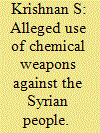

|
|
|
|
|
| Summary/Abstract |
The US has justified the use of military force against the Syrian regime under Bashar al-Assad, after its alleged use of chemical weapons against civilians. However, as long as the UN Security Council does not agree to intervention, unilateral American action is not permissible under the UN Charter. Even the principle of “responsibility to protect” is not justified in this case, as action would most likely be short, punitive and unlikely to end the attacks on Syrian civilians. The use of force rules, originating in customary international law and partially codified in the UN Charter, establish the lawful framework for the initiation of military activity by a government. Humanitarian intervention or a military campaign calculated to stop widespread attacks on a civilian population, including acts of genocide, other crimes against humanity and war crimes is also contested as it is not defined in the UN Charter, although many scholars and activists claim it is supported by the charter's central objective to defend human rights and fundamental freedoms.
|
|
|
|
|
|
|
|
|
|
|
|
|
|
|
|
| 9 |
ID:
076695
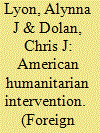

|
|
|
| 10 |
ID:
173227
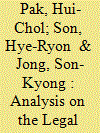

|
|
|
|
|
| Summary/Abstract |
At present, some states are undertaking military interventions in different parts of the world, contending the ‘legitimacy’ of their i006Evocation of responsibility to protect civilians from a humanitarian crisis. Discussions at international forums concerning the concept of Responsibility to Protect (R2P) are inconclusive about its legal nature and application. While some scholars and states support the doctrine of R2P as being legitimate, others challenge or take a rather sceptical view. Divergent views seem to be originating from its incompatibilities with the rules of international law, including the Charter of the United Nations. What is controversial is that the supporters of R2P are mainly from the West, while objections to R2P are from developing countries mainly from West Asia or Africa. This raises concerns about the possibility of future applications of R2P in any of the countries in these regions or other developing countries. The article, analyses the legal nature of R2P in terms of the main principles of international law and other sources of international law and argues that the legitimacy and international legal effect of R2P are uncertain.
|
|
|
|
|
|
|
|
|
|
|
|
|
|
|
|
| 11 |
ID:
119270
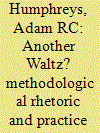

|
|
|
|
|
| Publication |
2012.
|
| Summary/Abstract |
Transnational human rights networks span the globe, and have become more numerous and influential since the 1970s. Yet we still know relatively little about the strategic interaction between transnational advocates and their targeted state actors. Focusing on such a strategic interaction, we argue that transnational advocacy is less a diffusion of authority away from state actors than a change in the ways in which the politics of accountability is conducted between sophisticated state and non-state actors. In particular, we show that targeted actors (e.g. impugned states) can develop their own discursive capacities to challenge the facts and interpretations offered by transnational advocates and 'turn the tables' on them, expanding the scope of accountability to include the conduct of NGOs themselves. Empirically, we examine the efforts made by Human Rights Watch (HRW) to make the Israel Defense Forces (IDF) accountable during the Second Lebanon War of 2006 and the Gaza war of 2008-9.
|
|
|
|
|
|
|
|
|
|
|
|
|
|
|
|
| 12 |
ID:
153860
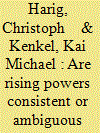

|
|
|
|
|
| Summary/Abstract |
This article illustrates how Brazil responded to the policy challenges its foreign policy activism posed for its engagement with a fundamental question of the international order: the tension between the protection of human rights and the prohibitions on intervention and the use of force. Leading the military component of the UN Stabilization Mission in Haiti (MINUSTAH) implicated accepting the mission's robust mandate that contradicted Brazil's traditional foreign policy positions. Notwithstanding this apparent contradiction, the country's diplomats also tried to shape UN debates on intervention norms, resulting inter alia in the ‘responsibility while protecting’ initiative. By analysing diplomatic efforts and military actions on the ground, we argue that since the watershed moment of becoming the most influential troop contributor to MINUSTAH, interests and actions of the armed forces increasingly contradict the efforts of Brazil's diplomatic establishment. The influence of Brazil's diplomacy in shaping intervention norms has proved to be rather elusive, compared with its military's palpable role in developing robust approaches for peacekeeping mandates revolving around the protection of civilians. Yet we argue that this apparent contradiction should not be seen as inconsistency. Instead, the case of Brazil shows typical signs of the ‘graduation dilemma’, in which both diplomats and military behaved in an eminently rational fashion.
|
|
|
|
|
|
|
|
|
|
|
|
|
|
|
|
| 13 |
ID:
049251
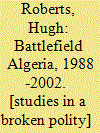

|
|
|
|
|
| Publication |
London, VERSO, 2003.
|
| Description |
xxiv, 402p.: tableshbk
|
| Standard Number |
185984684X
|
|
|
|
|
|
|
|
|
|
|
|
Copies: C:1/I:0,R:0,Q:0
Circulation
| Accession# | Call# | Current Location | Status | Policy | Location |
| 047230 | 965.05/ROB 047230 | Main | On Shelf | General | |
|
|
|
|
| 14 |
ID:
085272
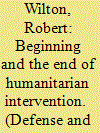

|
|
|
| 15 |
ID:
115602
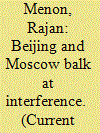

|
|
|
|
|
| Publication |
2012.
|
| Summary/Abstract |
China and Russia's stance on Syria is a result of their convergent conceptions of sovereignty and humanitarian intervention, their compatible assessments of the nature of the conflict and of Western motives, and the lessons they learned from the Libyan uprising.
|
|
|
|
|
|
|
|
|
|
|
|
|
|
|
|
| 16 |
ID:
132144
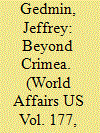

|
|
|
|
|
| Publication |
2014.
|
| Summary/Abstract |
Ukraine is lost. At least lost as many of us had once imagined it-as a potential member of the European Union and, perhaps one day, of NATO. Thank the Kremlin's visionary leader for that. It's striking how confidently and quickly Russian President Vladimir Putin gobbled up Crimea. Although it was a clear-cut case of unprovoked aggression, followed by annexation, the United States and its allies were unable to lift a finger.
|
|
|
|
|
|
|
|
|
|
|
|
|
|
|
|
| 17 |
ID:
151638
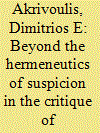

|
|
|
|
|
| Summary/Abstract |
Realist and Marxist critiques of humanitarian intervention are distinctively materialistic in scope. The IR literature has already described this scepticism as a ‘hermeneutics of suspicion’, a term associated with the work of Paul Ricoeur, which aims to unearth the intervenors’ material and geopolitical interests hypocritically hidden behind the pretext of humanitarianism. The article first notes the decontextualised misappropriations of the term as an iconic and omnipotent instrument of doubt, as well as the limitations of the social constructivist response on the matter. By contextualising Ricoeur’s hermeneutics of suspicion as developed in his life work, the article then calls for an extension of critique from a hermeneutics of suspicion to a hermeneutics of naïveté. Applied in the critique of the ideology of humanitarian intervention, the article thus calls for a shift of focus from the examination of the distorting (Marxism, realism) and legitimising (social constructivism) functions of this ideology to its integrating function that has allowed the evocation of humanitarian principles as international norms, and uncritically vindicates this arrangement. The article proposes that this hermeneutical detour could allow critique to proceed to a greater analytical depth, opening up a set of critical questions.
|
|
|
|
|
|
|
|
|
|
|
|
|
|
|
|
| 18 |
ID:
079470
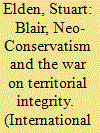

|
|
|
|
|
| Publication |
2007.
|
| Summary/Abstract |
This essay uses the war on Iraq and in particular the legal advice of the British Attorney General to explore two tensions.1 The first is between Blair's foreign policy with its 'ethical dimension' and call for humanitarian intervention by the international community and the project of the neo-conservatives in the US. The second is in the notion of territorial integrity, which means both the idea of territorial preservation and that within this territory a state is sovereign. The war on Iraq, which violated territorial sovereignty, was fought against a backdrop of preserving the existing territorial settlement, especially regarding the Kurds. While Blair and the neo-conservatives share an argument against territorial sovereignty as an unconditioned absolute, and hold a belief in the need for territorial stability, their positions differ on the mechanisms needed. Blair strove for an internationalist position; the neo-conservatives argue for US exceptionalism. Ultimately though, faced with a decision, Blair joined the US in violating a sovereign state's territorial integrity without international support
|
|
|
|
|
|
|
|
|
|
|
|
|
|
|
|
| 19 |
ID:
076821
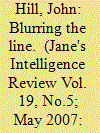

|
|
|
| 20 |
ID:
147707
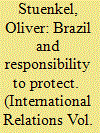

|
|
|
|
|
| Summary/Abstract |
This article questions the still broadly accepted notion that the global debate about Responsibility to Protect (R2P) is divided into a Western (or Northern) ‘pro-R2P’ camp and a non-Western (or Southern) ‘anti-R2P camp’. In the same way, the relatively broadly accepted assertion that R2P is a Western concept overlooks the important contributions developing countries have made in the creation of the norm. Brazil’s stance vis-à-vis R2P, analyzed in this article, is a powerful example of this reality, and the country has, in the past years, temporarily assumed leadership in the discussion about how to strengthen the norm. Paradoxically, Brazil’s move was widely seen as obstructionist. This points to a broader bias that tends observers not to grant non-Western powers the same agency in the creation of rules and norms. The ongoing multipolarization will force observers to correct this vision, as countries in the Global South such as China will be increasingly able to ‘act upon’ R2P, a capacity that so far has been reserved for established powers.
|
|
|
|
|
|
|
|
|
|
|
|
|
|
|
|
|
|
|
|
|